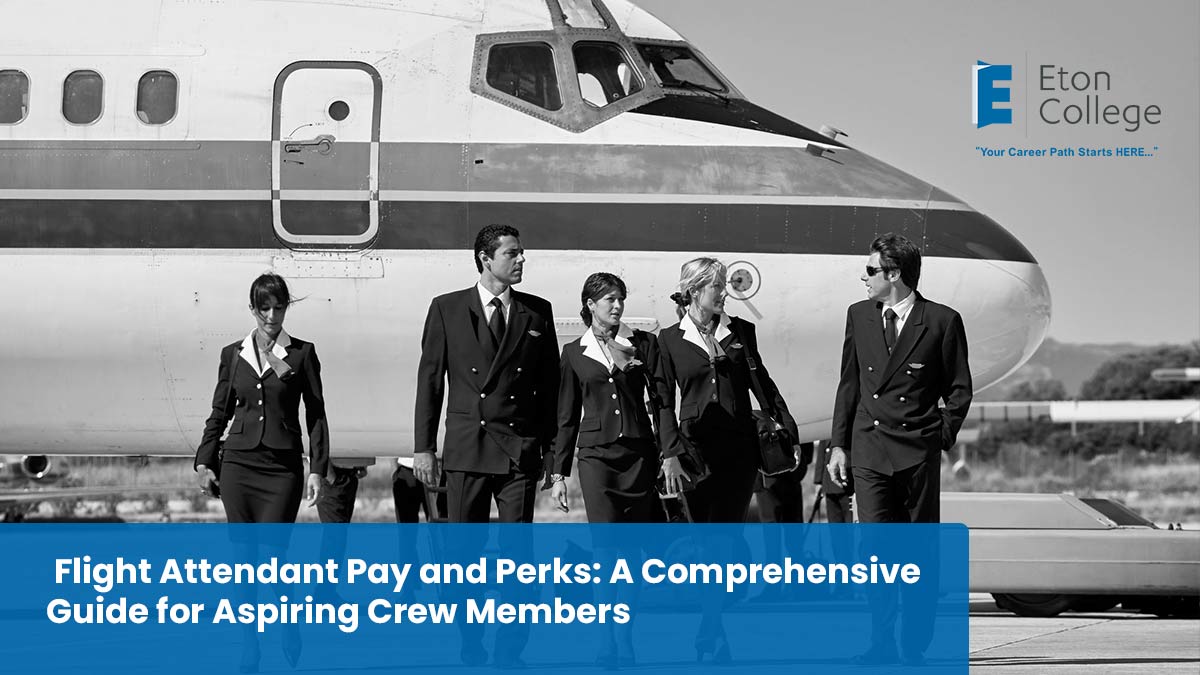Key Takeaways:
- Competitive Salary: Flight attendants in the United States earn a salary that ranges from $45,000 to $70,000, with potential for additional earnings through per diem and overtime.
- Influencing Factors: Factors like airline size, base location, and seniority impact salary levels, with experienced attendants and those in major cities often earning more.
- Perks and Benefits: In addition to base pay, flight attendants enjoy benefits such as free or discounted flights, health insurance, and flexible schedules.
- Career Growth: Beyond cabin crew, experienced flight attendants can move into roles in training, recruitment, and private aviation, with higher earnings.
For many aspiring flight attendants, understanding potential earnings is a key factor in choosing this career path. As of recent data, the average flight attendant salary in the United States typically ranges between $45,000 to $70,000 per year, depending on various influencing factors. These include years of experience, airline company, base location, and additional responsibilities. For instance, entry-level positions may start at around $30,000 annually, while more seasoned professionals can earn upwards of $80,000, especially those working for major airlines or handling international flights.
Factors Influencing Flight Attendant Salary
Flight attendant salaries aren’t uniform; they vary based on several important elements:
- Airline Type and Size
Major carriers generally offer higher pay and more benefits compared to regional or budget airlines. Working with well-known airlines like Delta, American Airlines, or United can provide not only a higher base salary but also increased job security and growth opportunities. - Geographical Location
Flight attendants based in cities with a high cost of living, such as New York, Los Angeles, or Chicago, often receive higher wages to compensate for living expenses. Moreover, certain airlines adjust pay scales based on the flight attendant’s base location, making location an essential factor in salary calculations. - Seniority and Experience
Like many career paths, experience in the industry is rewarded. Senior flight attendants enjoy higher pay rates, schedule flexibility, and priority for desirable flight routes. Additionally, seniority can lead to advanced roles such as lead flight attendant or purser, which come with further salary increases.
Additional Earnings and Perks
Besides base pay, flight attendants enjoy several additional forms of compensation:
- Per Diem Allowances: While on duty and away from their home base, flight attendants receive per diem allowances for meals and expenses.
- Overtime Pay: Working beyond scheduled hours, especially on international or long-haul flights, often qualifies flight attendants for overtime pay.
- Bonuses and Profit Sharing: Some airlines offer annual bonuses or profit-sharing opportunities, further enhancing a flight attendant’s income.
Benefits Beyond the Salary: Lifestyle Perks
One of the most appealing aspects of a flight attendant career is the variety of lifestyle benefits. While monetary compensation is important, the added perks make this profession unique and rewarding:
- Free or Discounted Travel: Many airlines offer flight attendants free or significantly discounted flights for personal use, both domestically and internationally. Additionally, these benefits often extend to family members, allowing them to explore new destinations.
- Healthcare and Insurance Packages: Most airlines provide comprehensive health, dental, and vision insurance. Many flight attendants also have access to retirement plans, which often include employer contributions.
- Flexible Schedules: Although the hours can be unconventional, flight attendants often enjoy flexible work schedules, with opportunities to swap shifts or bid for preferred routes.
Career Advancement Opportunities
A career as a flight attendant offers room for professional growth. With experience, many flight attendants move into senior roles that come with added responsibilities and increased salaries:
- Lead Flight Attendant or Purser
This role involves supervising cabin crew members, managing in-flight services, and ensuring passenger comfort and safety. As a lead flight attendant or purser, individuals earn a higher salary and gain valuable management experience. - Training and Recruitment
Many experienced flight attendants transition into roles that focus on training new hires or assisting in recruitment processes. This pathway allows for a more stable schedule and offers a unique perspective on the operational side of aviation. - Corporate and Private Aviation
Some flight attendants choose to work in private or corporate aviation, where they cater to exclusive clients on chartered flights or private jets. These roles typically offer competitive pay, premium amenities, and a more tailored flying experience.
Is a Flight Attendant Career Right for You?
For those drawn to travel and customer service, a career as a flight attendant offers both financial rewards and personal fulfillment. The opportunity to explore new cultures, meet diverse people, and work in a dynamic environment makes it an attractive option for many. Moreover, for those considering this path, Eton College provides specialized programs to prepare aspiring flight attendants for the demands of the industry—from safety protocols and customer service excellence to industry certifications that increase job prospects.
FAQ
- What is the average flight attendant salary in the United States?
The average salary for a flight attendant in the United States ranges from $45,000 to $70,000 annually, with the potential for additional income through overtime and per diem allowances. - How does location impact a flight attendant’s salary?
Flight attendants based in high-cost cities like New York, Los Angeles, or Chicago often receive higher salaries to accommodate the cost of living. Base location is a key factor in determining pay. - What additional benefits do flight attendants receive?
Flight attendants often enjoy a range of benefits beyond salary, including free or discounted flights, health insurance, retirement plans, and flexible schedules. These perks are a major draw for those entering the profession. - Is a university degree required to become a flight attendant?
While a university degree is not required, specialized training from institutions like Eton College enhances career prospects and prepares candidates for the diverse demands of the job. - Can flight attendants move into other roles within aviation?
Yes, experienced flight attendants can transition into roles in training, recruitment, management, or corporate aviation, allowing for career advancement and additional earning potential.
Taking Flight with a Rewarding Career
Becoming a flight attendant offers more than just a salary; it provides a unique lifestyle with experiences that few other jobs can match. From the opportunity to travel the world to the flexibility and growth within the airline industry, this career path is filled with possibilities. If you’re ready to embark on a fulfilling journey, Eton College’s programs are designed to equip you with the skills needed to succeed and thrive in the aviation industry.




